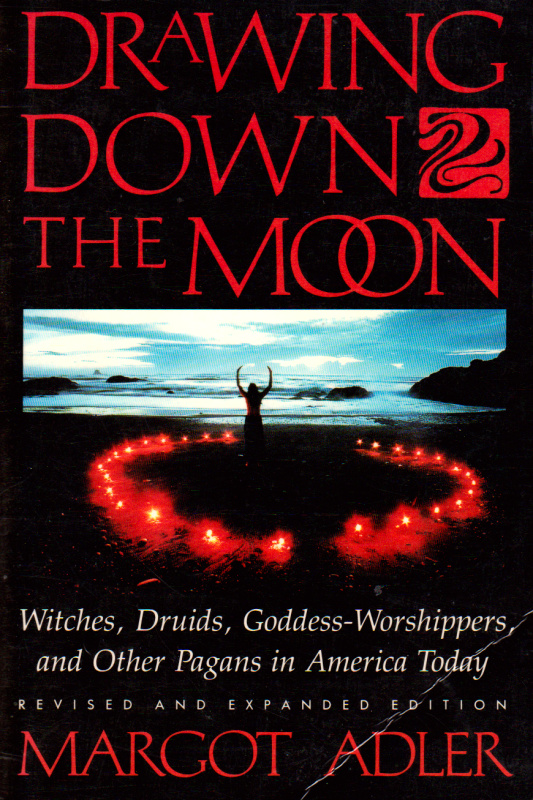Drawing Down the Moon by Margot Adler

Author:Margot Adler
Language: eng
Format: epub, pdf
Publisher: Penguin Group US
Published: 2011-07-25T16:00:00+00:00
11.
Religions of Paradox and Play
“LARGE PARTS of the Neo-Pagan movement started out as jokes, you know,” Robert Anton Wilson, author, Witch, and a former editor of Playboy, told me one day. “Some of the founders of NROOGD will tell you their order started as a joke; others will deny it. There is a group that worships Mithra in Chicago which started out as a joke. The people in many of these groups began to find that they were getting something out of what they were doing and gradually they became more serious.”
There have always been spoofs on religion. But religions that combine humor, play, and seriousness are a rare species. A rather special quality of Neo-Pagan groups is that many of them have a humorous history. As we have seen, the Church of the Eternal Source, a serious attempt to revive the ancient Egyptian religion, began as a series of yearly Egyptian costume parties. The Reformed Druids of North America began as a humorous protest movement against a regulation at Carleton College requiring attendance at chapel. The Elf Queen’s Daughters, a network of “elves” located mostly in the Far West, sent out each week three pages of quite beautiful poetic prose, most of it composed by automatic writing. “Most of it’s nonsense,” they told me. “We don’t take it too seriously.” In Minneapolis a group calling itself the First Arachnid Church began to publish hilarious leaflets calling for the worship of the Great Spider and the True Web.1 It was pure satire and a great parody of fundamentalist Christian leaflets. But it was also pure Neo-Paganism. And, most preposterous of all, there is the worship of Eris, goddess of chaos and confusion, popularized in the science fiction trilogy Illuminatus. 2
Since we live in a culture that makes a great distinction between “seriousness” and “play,” how does one confront the idea of “serious” religious groups that are simultaneously playful, humorous, and even (at times) put-ons? How seriously can we take them?
The relationship between ritual and play has long been noticed. Harvey Cox, in Feast of Fools, develops a theory of play, asserting, like others before him, that our society has lost or mutilated the gift of true festivity, playful fantasy, and celebration. In 1970, when an interviewer asked Cox about the “rise of the occult,” he replied that astrology, Zen, and the use of drugs were “forms of play, of testing new perceptions of reality without being committed to their validity in advance or ever.” When the interviewer observed that sociologist Marcello Truzzi had called the occult “trivial” because people were not serious about it, Cox replied, “That’s exactly the reason it’s important. People are playing with new perceptions.”3
The classic study on play was written in 1944 by Johan Huizinga. “Human civilization,” he says, “has added no essential feature to the general idea of play.” Both animals and humans play, and play is irrational, defying logical interpretations. Yet the “great archetypal activities of human society are all permeated with play from the start.
Download
This site does not store any files on its server. We only index and link to content provided by other sites. Please contact the content providers to delete copyright contents if any and email us, we'll remove relevant links or contents immediately.
| Paganism | Wicca |
| Witchcraft |
Becoming Supernatural by Dr. Joe Dispenza(7105)
Tools of Titans by Timothy Ferriss(6946)
The Witchcraft of Salem Village by Shirley Jackson(6584)
Inner Engineering: A Yogi's Guide to Joy by Sadhguru(5895)
The Four Agreements by Don Miguel Ruiz(5510)
The Power of Now: A Guide to Spiritual Enlightenment by Eckhart Tolle(4755)
The Wisdom of Sundays by Oprah Winfrey(4626)
Room 212 by Kate Stewart(4106)
Fear by Osho(4085)
Pale Blue Dot by Carl Sagan(4001)
The David Icke Guide to the Global Conspiracy (and how to end it) by David Icke(3881)
Rising Strong by Brene Brown(3780)
Animal Frequency by Melissa Alvarez(3755)
How to Change Your Mind by Michael Pollan(3676)
Sigil Witchery by Laura Tempest Zakroff(3651)
Real Magic by Dean Radin PhD(3568)
Secrets of Antigravity Propulsion: Tesla, UFOs, and Classified Aerospace Technology by Ph.D. Paul A. Laviolette(3445)
The Art of Happiness by The Dalai Lama(3382)
Man and His Symbols by Carl Gustav Jung(3315)
